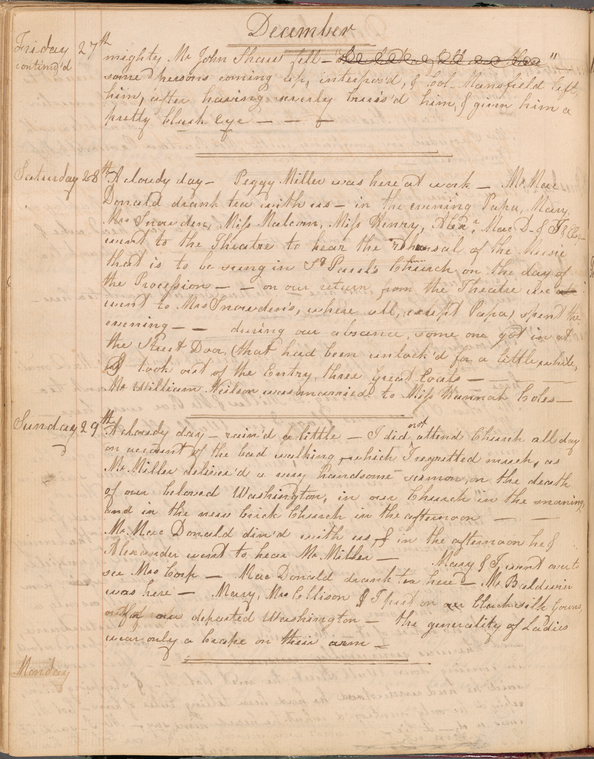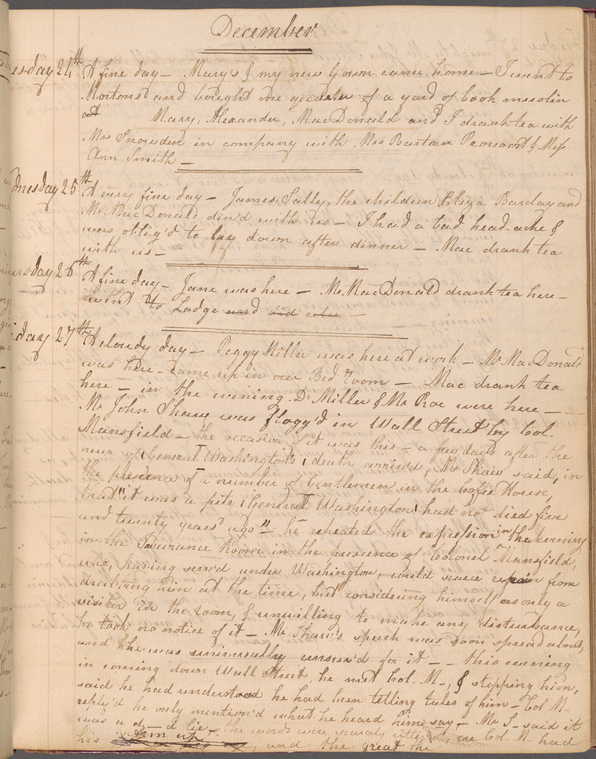Elizabeth De Hart Bleecker Diary, December 1799
“Mr John Shaw was flogg’d in Wall Street by Col. Mansfield--the occasion of it was this -- a few days after the news of General Washington’s death arriv’d, Mr. Shaw said, in the presence of a number of gentlemen in the Coffee House, that “it was a pity, General Washington had not died five and twenty years ago”-- he repeated the expression in the evening in the Insurance Room in the presence of Colonel Mansfield, who, having serv’d under Washington, could scarce refrain from drubbing him at the time, but considering himself as only a visitor in the room, & unwilling to make any disturbance, he took no notice of it-- Mr. Shaw’s speech was soon spread about, and he was universally censur’d for it -- this evening in coming down Wall Street, he met Col. M., & stopping him, said he had understood he had been telling tales of him - Col. M. reply’d he only mention’d what he heard him say -- Mr S. said it was a d____d lie, the words were scarcely utter’d, ere Col. M had his arm up, and the great the mighty Mr John Shaw fell--some persons coming up, interpos’d, & Col. Mansfield left him, after having severely bruis’d him, & given him a pretty black eye” —Elizabeth De Hart Bleecker, Friday, December 27, 1799.
The melancholy news of General Washington's Death arriv’d in New York” a few days before Mansfield knocked Shaw out on Wall Street. New York was in mourning, as was the rest of the country. At first blush, Col. Mansfield's harsh reaction to John Shaw’s insult of George Washington makes perfect sense. From his experience as Revolutionary War officer, Mansfield no doubt considered Washington’s patriotism to be unassailable. Yet Mansfield and Shaw’s fight was about much more. Debates over Washington reflected an often unacknowledged difficulty: Americans overthrew a monarch, but they had a much more difficult time ridding the nation of monarchical culture.
Washington had won the Revolutionary War, only to resign his command and return home to his farm (plantation) like the Roman Cincinnatus. He could have been an emperor. Instead he showed what respect for republican principles really looked like. Again and again, he rose to the occasion when called upon by his fellow citizens. First he oversaw, and give legitimacy to, the Constitutional Convention that met in Philadelphia in 1787. Then he presided over the government they created, serving as the first President of the United States. In 1796, he relinquished power after two terms, setting an important precedent about the transfer of power in a republic. No political disagreements could undermine these accomplishments.
And so New Yorkers mourned him widely. On December 21st, Bleecker noted that “The Bells of every Church were muffled and rung from twelve to one O’clock—they are to continue ringing them the same every day till the 24th inst. on account of the death of General Washington.”
Washington, though, had also embraced some monarchical trappings. Republican critics of Washington wondered why he hadn’t explicitly objected to proposals to put his likeness on coins, or why he didn’t speak out against John Adams’ famous suggestions to give him an august title. More damningly, throughout his two terms in office, President Washington held formal levees. Similar to receptions at a monarchical court, Washington would wear formal attire (including a ceremonial sword) and receive visitors. Washington also made a number of trips throughout the country, stopping in small towns to bring the federal government—embodied in Washington—to the people.
What to make of Washington’s monarchical airs? For his political style, as well as for his embrace of Alexander Hamilton’s policies, Washington would come under criticism during the 1790s.
To many other Americans, Washington was, quite literally, indispensable to the republic. Washington was just acting accordingly.
This presented a conundrum. A republic was a nation of laws, not men. So what did it mean that the republic depended on Washington to hold it together? In that sense, much as Washington did everything to respect republican ideals, his very prominence meant that the United States remained somewhat monarchical. The fate of the nation seemed still to rest with an individual.
It was in this context that Americans mourned him in 1799. What John Shaw said in the Coffee House was disrespectful. Beyond that, the kerfuffle took place in the one of the most staunchly Federalist enclaves of New York; and Washington was a Federalist. Yet we cannot chalk this fight up to decorum or even the heated partisan political culture of the late 1790s.
Mansfield’s reaction only made sense because of the persistent notion that Washington was above party, above politics even, despite the fact he was a Federalist and pursued policies that generated a political backlash. It only made sense because Washington had a quasi-monarchical status, somehow embodying the nation itself, even though the United States was a republic where no individual was above criticism. When Shaw spoke ill of Washington, then, he threw all of these contradictions into sharp relief.
A few days after getting knocked out on Wall Street, “Mr John Shaw made a public apology in the Coffee House, for the speech he had made—his excuse was, that he was in liquor—a very good come off to be sure-drunk at twelve o’Clock at noon.” The only excuse for speaking ill of Washington was having too much to drink. That was probably a resolution that the guardians of Washington’s legacy could abide.
Further Reading
For more on Washington's image in the early republic, see T.H. Breen, George Washington's Journey : The President Forges a New Nation (New York: Simon and Schuster, 2016); Kathleen Bartoloni-Tuazon, For Fear of an Elective King : George Washington and the Presidential Title Controversy of 1789 (Ithaca: Cornell University Press, 2014); and Simon P. Newman, "Principles or Men? George Washington and the Political Culture of National Leadership, 1776-1801," Journal of the Early Republic 12(Winter, 1992), 477-507.
About the Early American Manuscripts Project
With support from the The Polonsky Foundation, The New York Public Library is currently digitizing upwards of 50,000 pages of historic early American manuscript material. The Early American Manuscripts Project will allow students, researchers, and the general public to revisit major political events of the era from new perspectives and to explore currents of everyday social, cultural, and economic life in the colonial, revolutionary, and early national periods. The project will present on-line for the first time high quality facsimiles of key documents from America’s Founding, including the papers of George Washington, Thomas Jefferson, Alexander Hamilton and James Madison. Drawing on the full breadth of the Library’s manuscript collections, it will also make widely available less well-known manuscript sources, including business papers of Atlantic merchants, diaries of people ranging from elite New York women to Christian Indian preachers, and organizational records of voluntary associations and philanthropic organizations. Over the next two years, this trove of manuscript sources, previously available only at the Library, will be made freely available through nypl.org.
Read E-Books with SimplyE
 With your library card, it's easier than ever to choose from more than 300,000 e-books on SimplyE, The New York Public Library's free e-reader app. Gain access to digital resources for all ages, including e-books, audiobooks, databases, and more.
With your library card, it's easier than ever to choose from more than 300,000 e-books on SimplyE, The New York Public Library's free e-reader app. Gain access to digital resources for all ages, including e-books, audiobooks, databases, and more.
If you don’t have an NYPL library card, New York State residents can apply for a digital card online or through SimplyE (available on the App Store or Google Play).
Need more help? Read our guide to using SimplyE.



